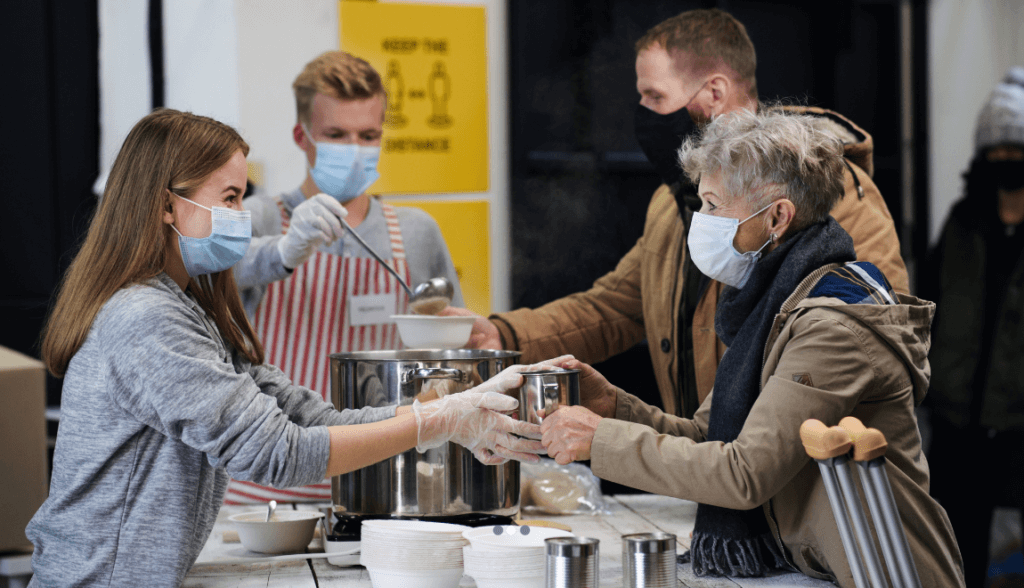Charity and Gratitude in America
Certain virtues define American culture at its best: a desire for individual justice based on human equality, an independent spirit, and rugged determination are some of the most well known. But during his nine-month travels in America, French philosopher Alexis de Tocqueville found an additional remarkable American quality: our dedication to charity. In Democracy in America, Tocqueville’s famous study of the American spirit, he noted, “I must say that I have seen Americans make a great deal of real sacrifices to the public welfare; and have noticed a hundred instances in which they hardly ever failed to lend a faithful support to one another.”
Since Tocqueville’s visit in the 1830s, America’s charitable spirit has continued to grow. Today, the United States’s 1.5 million nonprofit organizations are funded by millions of individual donors. They offer services ranging from educational resources and religious services, to political advocacy and private charity for food and housing, to funding and equipment for cancer research.
The charitable culture Tocqueville observed reveals the American belief that each of us are personally responsible for serving our communities. Rather than depending wholly on the government to guarantee a social net for those in need, we recognize that as responsible citizens we are obligated to volunteer our time and resources to the individuals and causes that need help. And we find that doing so brings us great joy.
Such voluntary charity based on Americans’ sense of gratitude and generosity has changed millions of lives for the better. On the other hand, billions of government tax dollars meant to aid struggling communities are funneled into temporary relief programs, reactive initiatives, and useless or redundant research projects, often after changing hands through various committees, agencies, focus groups, and “experts.” The results are too often characterized by unintended negative consequences, perverse incentives, “free-rider” problems, and new bureaucratic hurdles. These efforts, despite the intentions, end up giving more power to the state at the expense of individuals and communities, often harming the most vulnerable citizens by taking away their agency and limiting individual opportunity over time.
Due to a lack of accountability and oversight, the government wastes an astounding amount of its tax revenue every year: $1.7 billion annually for the upkeep of vacant properties, $12 million to subsidize an airport on Martha’s Vineyard, and from 2017-2019, $271.5 million in federal grants to ten Fortune 100 companies, just to name a few examples.
In contrast, our charitable culture is especially efficient at meeting specific community needs because it doesn’t assume that there are one-size-fits-all solutions. Problem solving, innovation, and oversight are always more successful when they are managed by people close to the community being served. It’s common sense—the closer one is to the problem, the better he understands it, the better he understands it, the easier it is to solve it.
Charitable virtue has countless benefits, but its perpetuation depends on each of us. Our world is increasingly individually focused, often at the expense of building a community where we feel obligated to support each other. But even small acts, such as donating old clothes to a shelter, or offering to make dinner for a neighbor, have an immediate effect on the lives of those around us.
We are grateful to the generations that came before us, who built communities where innovation, economic liberty, and personal freedom were allowed to flourish. Our prosperity, which is the direct result of our economic freedom, has led to material abundance. Out of our abundance, we are able to give. But our inheritance also comes with responsibility; our communities depend on us continuing to make personal sacrifices—some small and some large—for the sake of our fellow citizens in need. If we do not step up in this charitable spirit, then the government, along with all of its inefficiencies and makeshift solutions, will fill the gap.
Individual acts of charity have long been among America’s greatest virtues. Thanksgiving offers a chance to give thanks to those whose charity has affected our lives and renew our resolve to keep America’s charitable spirit alive.

